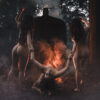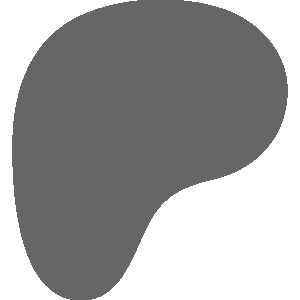I’ve been thinking a lot lately about how kink fits in with everything else in my life and experiences. Initially, it seemed so disconnected from everything else: this thing on the side, to be explored separately, and quietly, if at all. But the more I experience, and the more I think, the more ridiculous that seems. There are, of course, social norms and prejudices that impose limits, and in many cases, can’t be ignored (“give to Caesar what is Caesar’s …”). But at least in my own thinking, I want to better understand and integrate all of this.
One approach that I keep coming back to is wrestling with a spiritual understanding of things. I wrote earlier about rope as a kind of art and confession … a way of expressing the self and connecting with others. Lately, I’ve been thinking about selflessness and its importance in recognizing the connectedness that already exists. I’ll try to explain, but it’s hard to get the words right. (“He who knows, does not speak. He who speaks, does not know.”) So forgive me.
I identify as “spiritual, but not religious,” which means I agree with the mystics and the scientists:
- everything is connected and all of life is an exchange of energy (see: the First Law of Thermodynamics; see: “The great peril of our existence lies in the fact that our diet consists entirely of souls.” – traditional Inuit saying)
- all things are made of the same stuff (see: “We are all made of stars.” – Neil deGrasse Tyson; see: “You are gods.” – Jesus)
- we do not know what that stuff is or why it exists, we can only wonder, be in awe … or blind ourselves to wonder and numb ourselves against awe (see: “Concerning matter, we have been all wrong. What we have called matter is energy, whose vibration has been so lowered as to be perceptible to the senses. There is no matter.” … and … “Once you can accept the universe as matter expanding into nothing that is something, wearing stripes with plaid comes easy.” – Einstein; see: “A child said, What is the grass? fetching it to me with full hands; How could I answer the child? … I do not know what it is any more than he.” – Whitman)
It also means that the wisdom traditions passed down through the centuries all have truths to impart, even if those truths are wrapped in metaphor. [One of the greatest, and most tragic, ironies is that we continue to pound nails into each other using the hammer of metaphor, insisting our imperfect understanding, trapped (improbably) in our imperfect language, is TRUTH standing alone against LIES. The Word made flesh is crucified.]
But no matter which door you choose for entering the garden, which metaphor speaks most clearly to you, the flaming sword stands guarding the entrance: the anatta of Buddhism, the observer effect of physics, the moksha of Hinduism, the crucifixion of Christianity. All demand a denial of (a release from, a destruction of) self. And any glimpse of these truths must result in either fear-filled rejection, resulting in hate (hell), or a humbling diminishment of self, resulting in love (heaven).
Further, any practice has the potential to build arrogance or humility, depending on our understanding of and approach to that practice. Take the Zen cliche of “chop wood, carry water.” I do this work, this metaphor, this simple thing (and what isn’t simple, compared to “everything” and “nothing”), and I can’t escape the thousand traps, thinking: “see how well I chop and carry” or “see how everyone needs my chopping and carrying” or “I will chop and carry for others, and they will be pleased with me” or “it pleases me to do this thing.” Escaping the self, like thinking of nothing, is the exercise.
And what can possibly be different about sex and/or kink? A metaphor for union at the most intimate level; a metaphor for power/being and powerlessness/non-being at the most vulnerable level. Chop wood, carry water. Escape the self. Choose love, not fear. Pick up your cross and …
I don’t think this sterilizes the fun or decreases the pleasure. I do this thing (I have sex, I tie, I inflict pleasure and pain) and I experience the pleasure fully (orgasmically … “la petite mort”), and maybe, escape myself through it.
And yes, I know the Hindus will cry “kama,” claiming that pleasure is inherently focused on the self. But that’s exactly what I’m wrestling with here. I’m not going to conflate jacking off in my bedroom to some sort of holy penance, but it seems the potential is there for any sexual/kinky practice (rope or needles or floggers or just plain sex) to also be spiritual practice.
I think this is also distinct from “sex magic,” where the focus is typically on the harnessing of power to achieve the will of the self. (Though some strands focus more on sex as sacrament, which is more in line with what I’m talking about here.)
In the sense I’m trying to describe, I crucify myself as a sacrifice to god (“You are gods”) by making myself vulnerable (whether on the “top” or the “bottom,” we are always vulnerable), by bringing forth what I find in myself (out of nothing), by recognizing the interconnectedness of all things through the interconnectedness of what is immediately before me (the metaphor). I come to know myself in the other, and through love (anatta, moksha, crucifixion), find freedom (or if I fail, then through fear I find destruction).
So, we can beat and choke and grunt and fuck, and in themselves, these are neither good nor bad (though hopefully, at least pleasurable). But can we do more through these? Can we find humility? Can we escape the self? Can we love? Can I tie not just as art, expression, confession, connection … can I tie as love in the most Christian meaning of that term: as sacrifice, as crucifixion? Can I find not only self-expression but self-transcendence?
Or should I just have another beer and a slice of pizza?








